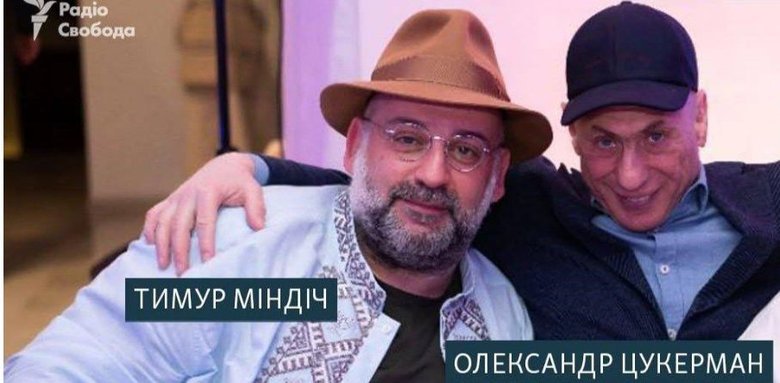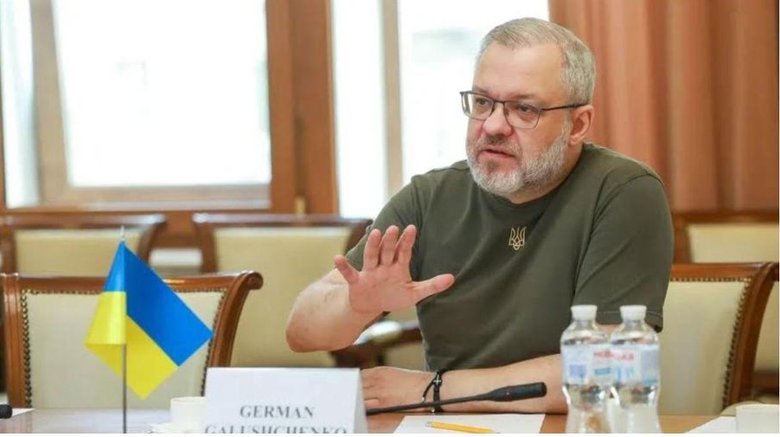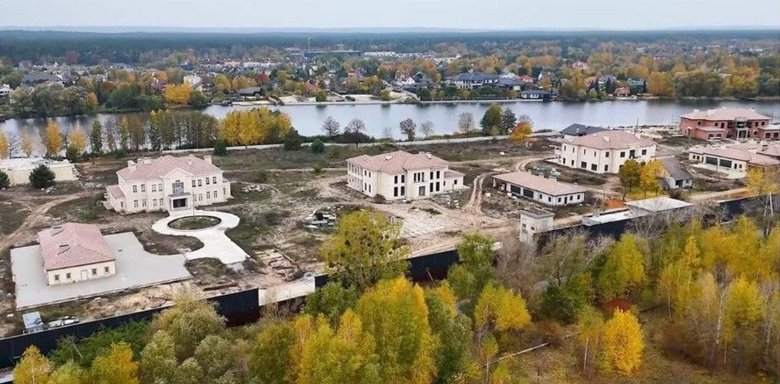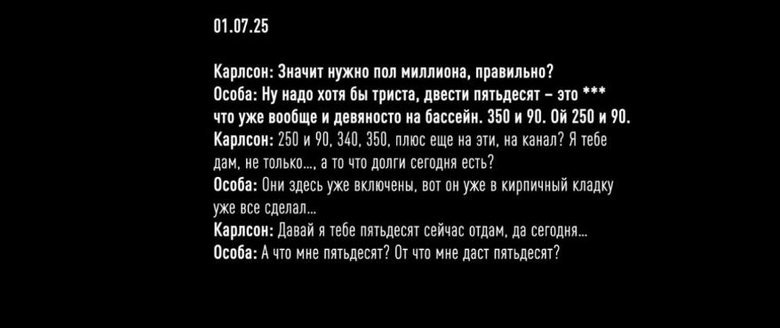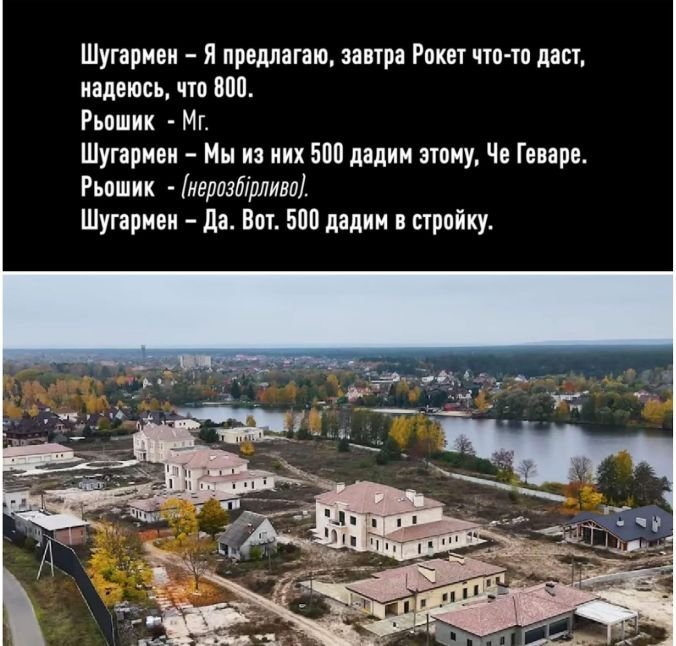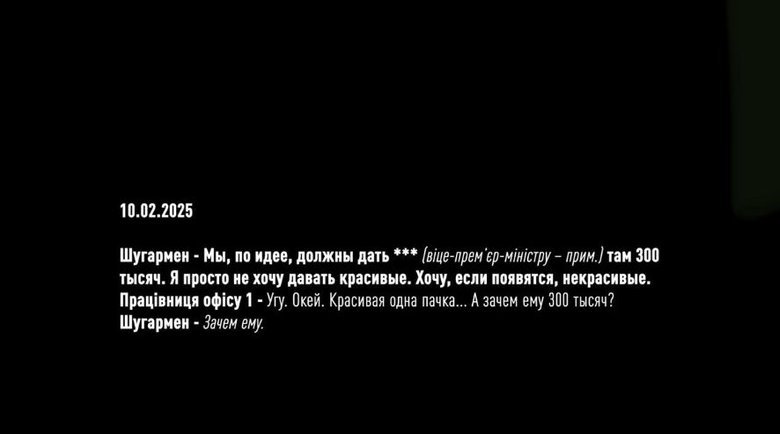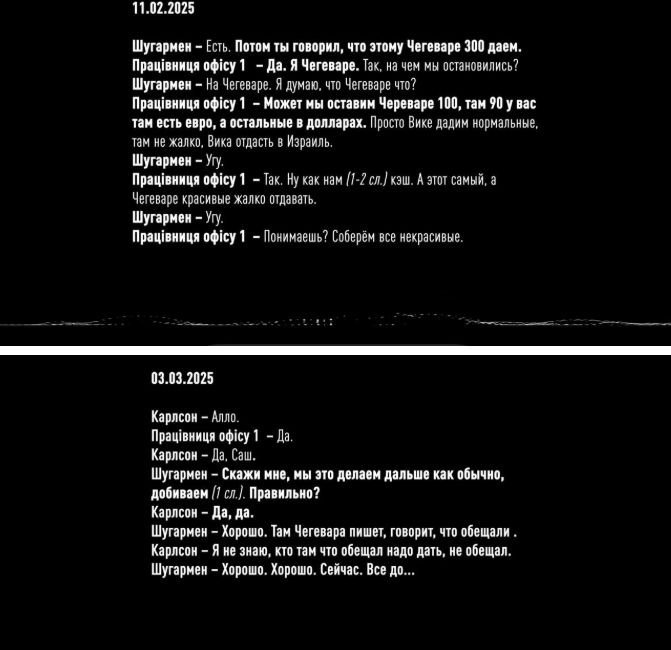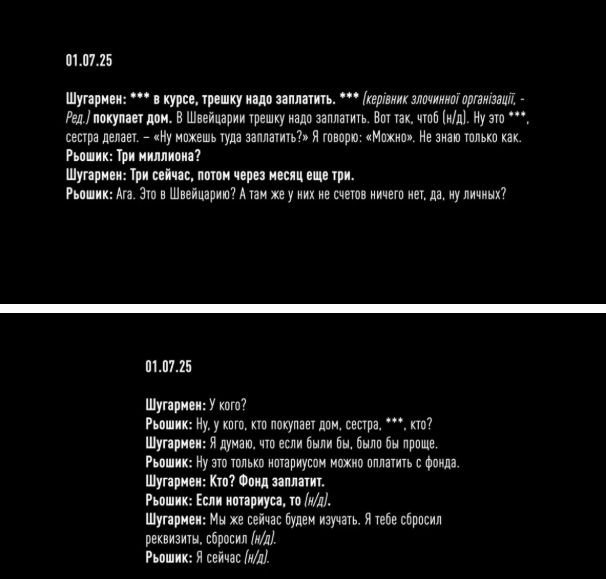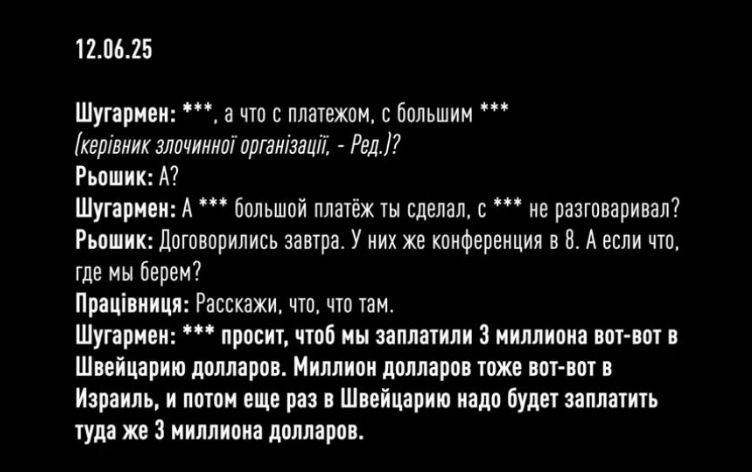On Karlson’s rooftop: how Mindich built mansions, why Chernyshov was given old dollars, and how advisers to traitors selected ministers
The three days since the Mindich tapes were made public have profoundly changed our understanding of how things work. The question is no longer whether the tapes exist, but who is really running this country.
Ukraine has seen more than one scandal involving the business entourage of its presidents, Yushchenko’s "dear friends", Yanukovych’s family, and Poroshenko’s Svynarchuks. But never before have senior government officials sunk so low that criminal cash-out operators would decide it was a waste to give them fresh dollar bills, and advisers to state traitors were kept on to conduct interviews for the post of energy minister.
On Tuesday, NABU released, in two batches, a new video series based on covert investigative actions documenting the activities of a criminal group that profited from schemes in the energy sector and laundered funds. The first concerned conversations in "Karlson’s" apartment – that is, Mindich’s. The second dealt with trips by Oleksii Chernyshov’s people to collect unlawfully obtained cash.
And in the evening, during a court hearing on a measure of restraint for one of the scheme’s participants, Ihor Myroniuk, an adviser to Herman Halushchenko, a SAPO prosecutor, disclosed even more shocking case materials – pressure exerted by Timur Mindich on Halushchenko and Umerov.
And finally, also in the evening, NABU and SAPO served former Deputy Prime Minister of Ukraine Oleksii Chernyshov with a third notice of suspicion on charges of illicit enrichment.
Taken separately, each episode may be hard to make sense of. But together they form a big corruption puzzle involving a specific group of people in power.
"I f#cking want to see the expert who can decipher this."
The first episodes in the case showed how 10–15% kickbacks were taken from "Energoatom" contractors and then laundered or passed through an office in central Kyiv belonging to the family of fugitive traitor Andrii Derkach. This was done by people with the nicknames Rocket, Tenor and Shugarman.
The next episodes explain what this money was spent on and why there are so many fictitious names in the case.
Disclaimer: they were invented in Mindich’s apartment to conceal people’s real names in case the conversations were being monitored. But it did not work.
In July, when the issue of serving a notice of suspicion on Oleksii Chernyshov was already being considered and there were many rumours about a suspicion for Mindich himself, the latter and his accomplice discussed whether law enforcement could decipher the substance of their conversations.
02.07.25
Shugarman: I, I f#cking want, I want to see the expert who can decipher this… I check all of this myself.
Karlson: What for? Why are you going to such lengths over this?
Shugarman: Well, for f*ck’s sake, I wrote down some questions, they might be able to answer at least some of them.
Karlson (whispering): I want to tell you — they have deciphered everything, all these codes; you stay here.
Shugarman: No, listen, we’ve already talked about this — if we have some rat on the inside…
Karlson: Yeah, but even the rats don’t know your codes… This is my water, drink your own, f*ck.
Unfortunately for Mindich, NABU really did manage to do this.
"The activities of Shugarman’s office, also known as the ‘Laundry’, were controlled by Karlson from an apartment located on the upper floors of a building on Hrushevskoho Street in Kyiv. It was there that they decided which persons had to be given or transferred funds, and in what amounts. That was also where the cash was handed over after first arriving at Shugarman’s office," said the head of the detectives’ department, Oleksandr Abakumov, in a comment to the video.
"Moreover, this apartment served as the place where, during personal meetings with the heads of central executive bodies, Karlson, without any legal grounds, exerted influence on them. In particular, to advance private interests in the energy and defence sectors," the detective noted.
On Monday, NABU spent almost the entire daylight hours conducting searches in apartments on Hrushevskoho Street, where Mindich may have been staying.
But it seems the most valuable material was still captured in the recordings.
One of them is dated 14 July 2025. It contains a fragment of a conversation between Karlson, Energy Minister Halushchenko and Shugarman. During the meeting, the president summons Halushchenko, and the participants discuss this.
Energy Minister: Hello, hello. Greetings, ***, greetings. That’s it. Yes. Yes. Right.
Karlson: Swing by? No?
Energy Minister: Well, I’m off.
Shugarman: And you said no one talks to you about anything. And now look at this.
Karlson: Yeah, he read the text message.
Energy Minister: And what did you write?
Karlson: That *** wants to talk to you.
Energy Minister: All right.
Sugarman: No, call ***.
Karlson: Not like that, sorry, how many times have I told you: call ***.
Energy Minister: And what am I supposed to do with him?
Karlson: Listen, ***, that’s it, you understand, it’s not exactly an option for me to go work as a janitor; I’ll do whatever you say, whatever you need, I’m yours. Say "plus" and that’s it.
In other words, the conversation takes place three days before the reshuffle of the Cabinet of Ministers. By then, there were already rumours that Halushchenko would leave his post as energy minister. But the idea that he would become justice minister was still seen as completely surreal.
And here, as we can see, Mindich is advising the minister to promise the president that he will do everything he wants.
In the summer, Censor.NET had already reported this story: since late 2022, the media have referred to Mindich as a person who has significant influence over processes at Energoatom and Naftogaz.
In particular, it is Mindich who is associated with the appointment of then regional development minister Oleksii Chernyshov as head of Naftogaz.
According to the outlet’s sources, until the summer of 2021, energy issues at the Office of the President were overseen by President Volodymyr Zelenskyi’s adviser Serhii Shefir. But after the attempt on his life, he stepped away from these matters and passed this area on to… Tymur Mindich. And it is with Mindich that Censor.NET’s sources associate the growing influence of figures such as Herman Halushchenko and former Deputy Head of the Office of the President, Rostyslav Shurma.
They also say that Mindich always defended Halushchenko before the president and called him his only mainstay and an honest person in the energy sector. They further say that Mindich was "overseeing" then energy minister Halushchenko and that it reportedly went as far as him setting tasks specifying what was to be done on which day.
The NABU recordings do not contain specific instructions from Mindich to the energy minister, but from the released fragment, it is clear that they are very close in certain informal interactions.
After the minister is summoned to the Office of the President of Ukraine, Karlson (Mindich) reminds Shugarman that the money needs to be passed on.
Karlson: So, did you bring me anything?
Shugarman: No, I told you — tomorrow. I’ll give it to you tomorrow (inaudible).
Figure out how much I should give you — 300, 500?
Karlson: I don’t know, that one still needs some too…
Shugarman (whispering): 150, 200, 350, and transfer 450 to ***, so that everything on the construction is closed (one word) — 500.
Two weeks earlier, Mindich had discussed this same construction project with a person close to him. She was strongly complaining that she had to wind down the construction.
Person 3: Look, we’ve really gone big there at your place, so just stopping and freezing it now — I can’t even imagine how, everything will be lost; if we have to mothball it, then we need to finish some of the work.
Karlson: Yes.
Person: Well?
Karlson: The same goes for the total area, which needs to be understood. We have to approach it sensibly.
Person: How so?
Karlson: Mothball all of it — not just stop, but mothball it.
Mindich then tries to persuade the woman that it’s only for a year.
Person 3: For the winter.
Karlson: For a year.
Person 3: Holy moly, I`ve, fck, put so much of my soul into it, fck...Just mothball it and leave. It’s awful, honestly!
Karlson: Well, we can’t, you understand that, right?
Person 3:This is a nightmare for me!
Carlson: And not for me? Psst, fcking idiot. (Whispers) — if he surfaces in the case, we’re fcked!
The conversation takes place a week after the hearings in the first case involving Chernyshov. At that point, it is only about transferring land in exchange for apartments. But the company "Zolotyi Bereh" is already mentioned.
Later, journalists from Bihus.Info will go to Kozyn and find the construction of four villas on the lakeshore being carried out by this very company.
According to the journalists, Chernyshov was building them not only for himself. From the NABU tapes, it is clear that all of this was being coordinated by Mindich.
On the tapes, he discusses in detail how much money is needed and for what.
Interestingly, this is not the first 500 that has gone into the construction.
In other episodes, dated as far back as March, an equivalent amount is already being handed over to Oleksii Chernyshov. And it is very telling where this money comes from.
/Translated from Russian (text on image) - ed. note
Shugarman: I suggest Rocket will give something tomorrow, I’m hoping for 800.
Rioshyk: Mm-hm.
Shugarman: Out of that we’ll give 500 to this one, Che Guevara.
Rioshyk: (inaudible).
Shugarman: Yes. That’s it. We’ll put 500 into the construction./
In other words, the money that was extorted from Energoatom contractors was going into the construction of private mansions instead of building proper protection for power substations.
The attitude with which the money was handed over to Chernyshov probably deserves separate attention. Because, judging by the conversations of the cash-out operators, the current deputy prime minister was such a disrespected figure for them that they even begrudged giving him new dollar bills, and they clarified questions about handing over the money with Mindich.
However, these were not the only properties money was being spent on. Separately, according to the recordings, Karlson–Mindich was supposed to receive a transfer of funds to purchase property in Switzerland.
If we recall the events of the summer, on 20 June MP Yaroslav Zhelezniak stated that Mindich had left the territory of Ukraine.
It is not known whether property had been bought for him before that.
In fact, these are not the only properties that were being built with stolen money.
On Tuesday, during the hearing on a measure of restraint for scheme participant Ihor Myroniuk (the "overseer" for the Energy Ministry), the prosecutor mentioned not only his intention to siphon money via Mauritius, but also to invest in the construction of 200 villas there.
And in this context, the focus should be not on the acquisitions of Myroniuk’s family and his partner, but on how he influenced the energy sector. Because this was not just about extorting money from enterprises.
The investigation believes that Myroniuk previously exerted influence over personnel policy and officials, including at this enterprise as well as at other energy companies.
In particular, on 7 July 2025, Myroniuk interviewed a candidate for the then-vacant post of Minister of Energy of Ukraine, Svitlana Hrynchuk.
The head of security at Energoatom, Dmytro Basov, and Myroniuk agreed on the defence strategy in a court case involving charges against former directors of a branch of JSC NNEGC Energoatom in a criminal offence.
Basov and Myroniuk repeatedly exerted influence on representatives of business entities, including suppliers of JSC NNEGC Energoatom. This influence consisted in suspending and enabling such suppliers’ financial transactions, as well as blocking and revoking their valid licences and technical documentation.
Myroniuk also told Basov that he had personally blocked an attempt by Petro Kotin, chairman of the Management Board of JSC NNEGC Energoatom, to speak with an outside lawyer. At the same time, the two of them discussed on 25 September whether Petro Kotin should return to Ukraine, since he could be served with a notice of suspicion.
With the involvement of Basov and other individuals, Myroniuk set up a system of governance in the Ministry of Energy and its legal entities.
In court, the prosecutor said that, at the time of his arrest, Myroniuk tried to destroy physical evidence, in particular "tearing paper documents into pieces in the bathroom, trying to hide them, and also throwing them out of the window." "In addition, he tried to get rid of his mobile phone by throwing it out of the apartment window. I also believe there is a risk of him obstructing the criminal proceedings in other ways," the prosecutor read out.
On 9 July of this year, together with Basov, Myroniuk organised the submission of two parliamentary inquiries from two MPs on topics agreed with him.
"Moreover, Myroniuk stated that, through a temporary investigative commission of the Verkhovna Rada and a legislative initiative, he could organise influence on certain processes and certain individuals, which creates a risk of obstructing criminal proceedings in other ways, using his connections and influence over individual members of the Verkhovna Rada of Ukraine and members of the temporary investigative commission," the prosecutor said (this is apparently a reference to the commission headed by Oleksii Kucherenko, which essentially became an instrument in the campaign against Volodymyr Kudrytskyi).
According to the prosecutor, on the same day, Basov told Myroniuk that it was necessary to involve staff of the State Bureau of Investigation in obtaining warrants to conduct searches in a separate criminal proceeding in order to sort out relations.
"Moreover, these individuals, where necessary, are able to involve representatives of the Office of the Prosecutor General, the Security Service of Ukraine and the State Bureau of Investigation in exerting pressure on certain persons, which proves the existence of their ties to senior officials of law enforcement agencies and the risk of obstructing the criminal proceedings," the prosecutor stated.
The NABU recordings contain material in which Basov reports to Myroniuk on arranging the publication of negative information, so-called smear pieces, in media outlets under his control.
On 25 September 2025, he also informed Basov that he had arranged for former member of the Supervisory Board Boiko to be brought to criminal liability on 19 September 2025. He further informed him about organising the publication of sponsored articles in media outlets in the city of Brussels and in the United Kingdom of Great Britain and Northern Ireland, as well as the submission of parliamentary inquiries.
On 14 October 2025, Myroniuk told Basov that he had close ties to the leadership of the State Bureau of Investigation, from whom he would receive information on the course and prospects of pre-trial investigations in certain criminal proceedings.
And even this incomplete list creates the impression that this country is not being run by five or six effective managers, but by five or six bribe-takers and advisers to state traitors who kept ministers on their payroll. Because from these recordings, Mindich does not look like someone capable of managing anything, but he clearly knows how to get money for a comfortable life.
Tetiana Nikolaienko, Censor. NET

